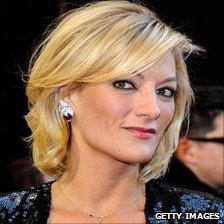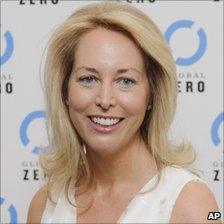Nuclear weapons still a threat, says documentary
- Published
Tom Brook on Countdown to Zero
The director of documentary Countdown to Zero, released in the UK this week, explains why she was drawn to address the clear and present danger of nuclear proliferation.
From the fictional TV drama Threads to the real-life events at the Chernobyl nuclear plant, the terror of a nuclear disaster permeated life in the 1980s.
With the end of the Cold War, though, these fears seemed to subside - only to be brought into sharp relief again by this year's events at Fukushima in Japan.
A timely point, then, to release Countdown to Zero, a sobering look at how likely a nuclear incident is and what its effect would be.
Its director is British documentary maker Lucy Walker, whose previous film, Waste Land, was Oscar-nominated earlier this year.

Walker's other documentaries include Waste Land and Blindsight
"I had no knowledge or expertise on the nuclear industry," explains Walker, who was asked to direct Countdown by An Inconvenient Truth producer Lawrence Bender.
"But I was a girl in the 1980s and remember being frightened that one day the bomb would go off.
"To me it was a realistic prospect that would happen, especially as my parents talked about having a bomb shelter in the back garden.
"I wanted reassurance but there was none to be had. So even though I knew nothing and needed to get expert advice, my childhood experience was enough of an impetus for me."
Released in the UK this week, Countdown to Zero deals with a new generation of arms races in Iran, Pakistan and North Korea.
It examines the ease with which terrorists may be able to acquire a weapon and lists some past near-misses which will have audiences squirming.
In Norway, for example, a weather satellite launch triggered a Russian alert in 1995. Boris Yeltsin was asked to push the button but did not believe it was an attack.
'Horror film scenarios'
Walker says she had no wish to scare-monger or sensationalise. "The fact is the chances of something happening in the future aren't zero," she explains.
"There are are some scary scenarios out there. The top one to worry about is terrorists getting hold of a nuclear weapon.
"Sometimes I felt I was dealing with horror film scenarios - and that included the idea an earthquake or a tsunami could trigger an accident in a nuclear power reactor.
"Even though my film mainly deals with nuclear arms proliferation, the consequences are the same."

Former CIA operative Valerie Plame Wilson is among the interviewees
Countdown to Zero documents what would happen if a nuclear weapon was detonated over a major city, detailing how many would die in the initial five-mile radius.
It could indeed be Threads for a generation born in the 1980s that grew up without the imminent fear of nuclear catastrophe.
"Maybe Fukushima has brought this to the attention of a whole new age group already," she offers.
"Maybe not to the extent they're going to end up in camps like Greenham Common, but I think they're a very enlightened generation who are calling for a debate on the whole nuclear issue."
There can be little surprise on which side of the fence Countdown to Zero falls when it comes to nuclear disarmament.
The film was produced with co-operation from the World Security Institute, a US think tank that has been calling for total disarmament since 2008.
Yet Walker set out to get as much differing opinion as possible, ending up with an impressive list of on-camera interviewees.
'Secretive' industry
These range from Mikhail Gorbachev - whom Walker describes as "brilliant" - to former PM Tony Blair.
"Multiple interviewees did turn us down, though, as the industry is so secretive," the director admits.
"The American government said they were considering our request. As far as I know, they still are and that was two years ago."
Even if the USA and Russia have signed an arms reduction agreement, Walker cannot say if there ever will be zero nuclear weapons.
"What I wanted was to make a film to avoid a nuclear catastrophe," she explains.
"The chances are if something does happen, we won't have the luxury of hindsight or asking why."
Countdown to Zero is out in the UK on 23 June.